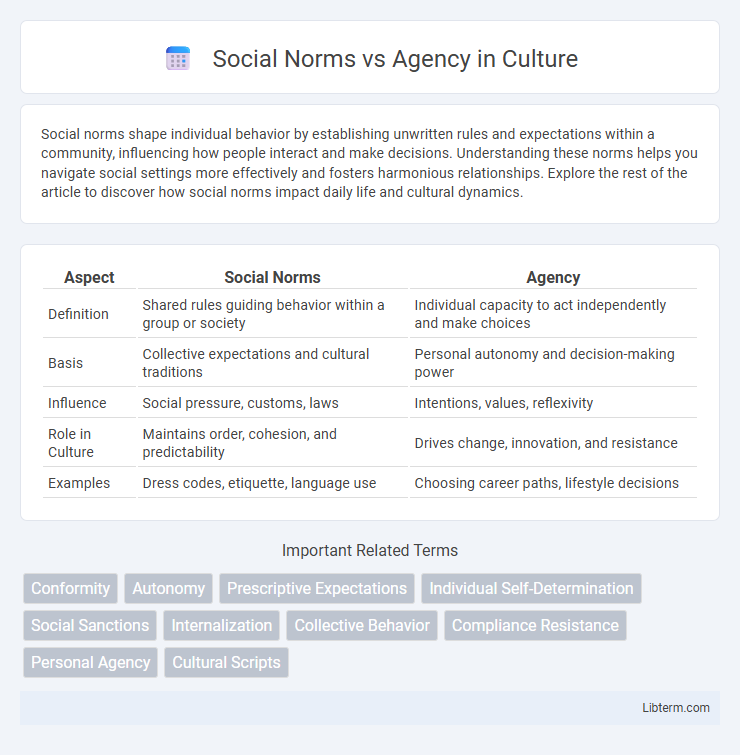Social norms shape individual behavior by establishing unwritten rules and expectations within a community, influencing how people interact and make decisions. Understanding these norms helps you navigate social settings more effectively and fosters harmonious relationships. Explore the rest of the article to discover how social norms impact daily life and cultural dynamics.
Table of Comparison
| Aspect | Social Norms | Agency |
|---|---|---|
| Definition | Shared rules guiding behavior within a group or society | Individual capacity to act independently and make choices |
| Basis | Collective expectations and cultural traditions | Personal autonomy and decision-making power |
| Influence | Social pressure, customs, laws | Intentions, values, reflexivity |
| Role in Culture | Maintains order, cohesion, and predictability | Drives change, innovation, and resistance |
| Examples | Dress codes, etiquette, language use | Choosing career paths, lifestyle decisions |
Understanding Social Norms: Definition and Examples
Social norms are unwritten rules and shared expectations that guide behavior within a group or society, influencing individuals without formal enforcement. Examples include shaking hands as a greeting, queuing in line, or dressing appropriately for specific occasions, all of which maintain social order and cohesion. Understanding these norms is crucial for recognizing how social pressure shapes individual actions and how agency allows for conscious choice to conform or resist.
Agency Explained: What It Means to Have Autonomy
Agency refers to an individual's capacity to make independent choices and act according to personal values despite external pressures. It embodies autonomy, emphasizing self-governance and control over one's actions within social structures. Understanding agency highlights the balance between personal freedom and societal expectations, underscoring how individuals navigate norms to assert their identity.
The Historical Evolution of Social Norms
Social norms have historically evolved through complex interactions between cultural traditions, institutional changes, and collective human behavior, shaping societal expectations and individual actions over time. Early human communities relied on unwritten rules to regulate social order, which gradually formalized into codified laws and ethical standards as civilizations advanced. The dynamic tension between conformity to social norms and individual agency has continuously influenced the development of social, political, and economic systems throughout history.
How Social Norms Influence Individual Choices
Social norms shape individual choices by establishing unwritten rules that guide acceptable behavior within a community. These collective expectations influence decision-making processes, often leading individuals to conform to group standards to gain social approval or avoid sanctions. Internalizing social norms can limit personal agency by prioritizing group consensus over individual preferences.
Agency in the Face of Societal Expectations
Agency in the face of societal expectations involves individuals' capacity to make autonomous choices despite prevailing social norms. This dynamic emphasizes personal empowerment, where decision-making reflects internal values rather than external pressures. Understanding agency highlights the role of self-determination in challenging or conforming to cultural expectations.
Social Norms vs Agency: Points of Conflict
Social norms often impose external expectations that restrict individual agency by shaping behavior through societal pressures and cultural conventions. Agency represents the capacity for independent decision-making and self-determination, frequently clashing with rigid social norms that discourage deviation from accepted practices. Points of conflict arise when individuals seek personal autonomy in environments dominated by collective conformity, leading to tension between societal control and personal freedom.
Cultural Perspectives on Autonomy and Conformity
Cultural perspectives on autonomy and conformity reveal that social norms heavily influence individual agency, shaping behaviors and decision-making within a community. Collectivist cultures often emphasize conformity to group values, prioritizing social harmony over personal autonomy, whereas individualist societies promote self-expression and independent choice. Understanding these dynamics is crucial for analyzing how diverse societies balance social expectations with individual freedom.
The Role of Social Norms in Shaping Identity
Social norms play a crucial role in shaping individual identity by establishing shared expectations and behaviors within a community, influencing self-perception and social roles. These collective beliefs often constrain personal agency, guiding decisions and actions to align with culturally accepted standards. The dynamic interaction between social norms and individual agency continuously negotiates identity formation, reflecting both societal influence and personal autonomy.
Strategies for Balancing Social Pressure and Personal Agency
Effective strategies for balancing social pressure and personal agency involve setting clear personal boundaries and practicing assertive communication to maintain autonomy while respecting social norms. Utilizing mindful self-reflection helps individuals recognize when social influences impact decision-making, enabling conscious choices aligned with personal values. Developing supportive social networks fosters resilience against conformist pressures, empowering individuals to act authentically within societal expectations.
Future Trends: Redefining Agency in Modern Society
Emerging technologies and evolving social norms are reshaping the concept of individual agency by enabling greater personal autonomy and digital self-expression. Future trends indicate a shift towards decentralized decision-making frameworks powered by AI and blockchain, which challenge traditional collective norms and empower personalized choices. This transformation highlights the necessity to balance communal values with enhanced agency to foster inclusive, ethical societal progress.
Social Norms Infographic

 libterm.com
libterm.com